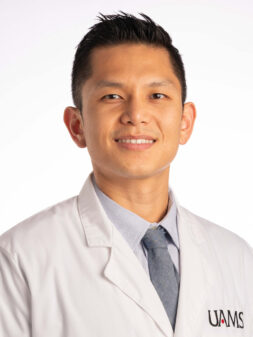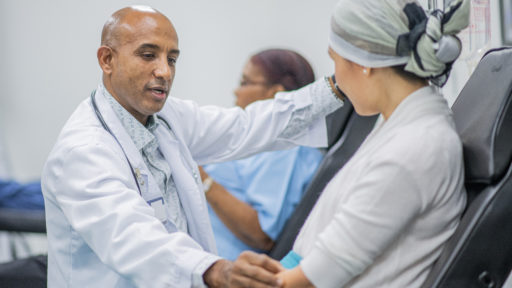Description
In this Conquering Cancer segment from THV11, Karen Fuller speaks with Dr. S. Thomas Kang, a cancer surgeon at UAMS Health. Together, they uncover the truth behind common cancer myths that often mislead the public. Dr. Kang provides clear, compassionate insights to separate fact from fiction, offering a better understanding of this formidable disease.
Video Player
Transcript
Brooke Buckner:
When an idea or belief takes off in popularity, it can seem to be true. In our Conquering Cancer story this month, THV11’s Karen Fuller goes one-on-one with a cancer surgeon at the UAMS Winthrop P. Rockefeller Cancer Institute to answer some common myths about the disease that can affect almost anyone.
Karen Fuller:
The work going on behind the scenes at the UAMS Cancer Institute is never-ending. Dr. Thomas Kang is one of many surgeons who dedicate their careers to preventing and treating one of the deadliest diseases known to man: cancer.
S. Thomas Kang, M.D.:
It’s not something that anybody wants to hear, and it is a very vulnerable time for our patients.
Fuller:
We asked Dr. Kang to address some myths commonly associated with cancer and based on a newly released article by the National Cancer Institute.
The first: is cancer a death sentence?
Dr. Kang:
Speaking just strictly from a surgical standpoint, cancer in general, and for most people, is not necessarily a death sentence.
Fuller:
Dr. Kang says advances in treatments are rapidly arriving, and he looks forward to those advances in his field of expertise: colorectal cancer.
Myth number two: will eating sugar make the cancer worse?
Dr. Kang:
Obviously, common sense dictates that having too much sugar, like drinking, say, two or three sodas a day, is probably not as good as, say, maybe choosing water over those beverages. But sugar in and of itself does not cause your cancer to grow or spread to other places.
Fuller:
This next myth has only been around for the past few decades: do cell phones cause cancer?
Dr. Kang:
And there are cell phone towers all around. There’s, you know, electromagnetic fields. So I think people may get concerned about that. But, you know, if there is even a risk of that, I think it’s probably minuscule and there is no definitive solid evidence to support that cell phones actually cause cancer.
Fuller:
Our next myth relates to homeopathic treatments: are there herbal products that can cure cancer?
Dr. Kang:
Generally, no. I do tell my patients that if they don’t think it’s harming them — I think for the most part, people take multivitamins, right? Can vitamins cure cancer? No. But we know that having a sufficient level of micronutrients like vitamins or minerals can help the body function.
Fuller:
And finally, do cancers act the same way in everyone? Dr. Kang says while there is a wealth of knowledge and studies on cancer characteristics, he looks at each patient he sees as an individual.
Dr. Kang:
Every body is different. And whenever I meet with my patients who have a cancer diagnosis, I try to come up with an individualized plan. And it needs to really address not just their cancer treatment needs, but their socioeconomic needs, spiritual needs, their physical needs. Because not everyone can undergo or tolerate the same kinds of treatments.
Fuller:
In Little Rock, Karen Fuller, THV11 News.


